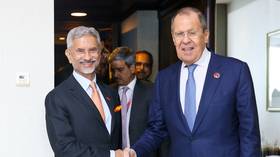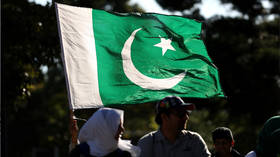India-Russia ties ‘extremely steady’ – FM

Indian Foreign Minister Subrahmanyam Jaishankar has described New Delhi’s relations with Russia as “extremely steady” over the past 70 years, adding that the two countries take “great care” to avoid any disruption to ties despite broader geopolitical changes.
Noting Moscow’s fractured relations with the West, the diplomat suggested that Russia will refocus on Asia as the epicenter of economic growth and development while cultivating alternative partnerships.
“The India-Russia relationship has actually held very, very steady,” Jaishankar was quoted as saying by the PTI news agency at an event in New York, where he is attending the UN General Assembly.
“Part of it is that I think there is an understanding in both countries that as big powers in the Asian continent, there is a kind of structural basis for having to get along, wanting to get along. And so we take great care to make sure the relationship is working,” he added.
Jaishankar argued that Russia is an Asian power “even though it has not always seen itself primarily as that.” He added: “I would actually predict that Russia would make very strenuous efforts to build alternative relationships, a lot of which would be in Asia. And this would reflect itself in economics and trade, possibly in other domains, as well.”
The top Indian diplomat further noted that post-World War II, Russia’s relations with the US, Europe, and China have experienced “very big ups and downs,” while ties with India have “actually held very, very steady.”
The comments came hours after Jaishankar delivered a speech at the UN General Assembly, where he argued for an equitable and inclusive global order, suggesting that “the days when a few nations set the agenda and expected others to fall in line are over.”
Speaking in New Delhi on the sidelines of the G20 summit earlier this month, Russian Foreign Minister Sergey Lavrov said Moscow and New Delhi are constantly in touch on various bilateral matters. The Russian diplomat also lauded India for its handling of the G20 presidency and for voicing the concerns of the Global South and developing countries.
When Lavrov met his Indian counterpart in New Delhi in March, he extended Russia’s support for India’s “quest to strengthen genuine multipolarity,” stating that “we are united in our commitment to shape a more just and democratic polycentric world order.” Lavrov noted that Moscow and New Delhi consistently oppose practices such as unilateral sanctions, threats, blackmail, and other types of pressure against sovereign states.
New Delhi has refrained from participating in Western sanctions imposed on Russia and has abstained from UN resolutions that condemn Moscow for its military operation in Ukraine. Over the past year, bilateral trade between the two countries has soared to all-time high and is predicted to surpass $50 billion in 2023. Notably, Russia has become a leading oil supplier to India.













